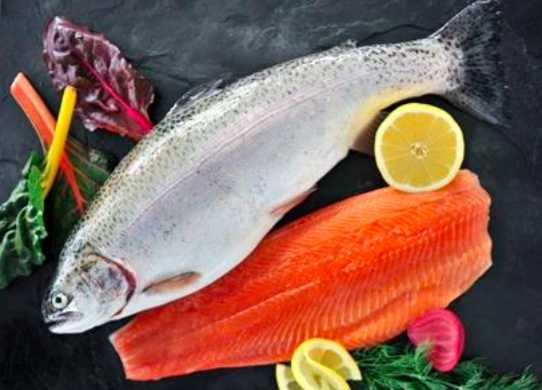Fish farms are already in the Great Lakes, helping and feeding Michigan
Considerable effort has been spent over the past year to portray proposals for fish farming in Michigan as a detrimental and risky enterprise for the Great Lakes, including a recent commentary in Bridge. However, real experience in other states and Canadian provinces demonstrate that thoughtful and diligent regulation can manage the risks and provide economic, ecological and social benefits for communities.
The aquaculture industry has rigorous, constant and effective regulatory oversight in Michigan. Moreover, retailers, such as Whole Foods and others, will only sell seafood meeting strict certifications, ensuring customers that the food they buy is sustainably raised. One of the freshest and healthiest seafood products Michiganders can find in local grocery stores is rainbow trout, farmed in the Ontario waters of Lake Huron.
Ontario has been farming rainbow trout in Lake Huron net pens for over 30 years. Canadian scientists have been continuously improving their understanding of the impact on the natural food web. Hard evidence exists that impacts are localized under the nets, and that those impacts include positive benefits to the local ecosystem, native fish, and recreational fishery. A well-developed regulatory protocol has allowed existing farms to steadily expand, or, in one case, to close when problems were detected.
The net-pen discussion is not new to Michigan and goes back to 1999. The Great Lakes Fishery Commission and the International Joint Commission held a roundtable to address water-quality and habitat-impact concerns related to large-scale aquaculture in the Great Lakes. Government agencies, academics and fish farmers have all agreed there are a limited number of suitable sites for net pen operations in Michigan, which provides effective limits to growth. The claim for 100-250 net pen sites around Michigan was fabricated to fuel the opposition.
Does Michigan have a potential for a $1 billion dollar aquaculture industry? Possibly: 60% of the world’s aquaculture production (an industry valued at more than $135 billion and growing) comes from freshwater systems. Large-scale aquaculture has been growing for the past 40 years and global suppliers have been increasingly innovative in developing sustainable seafood production. However, to be very clear, only a minor portion of this goal is capable through net farming in the Great Lakes. In Michigan, aquaculture growth will come from a variety of systems – open water, ponds, flow-through and indoor systems.
Commercial fish growers are not the only ones who benefit from Michigan aquaculture. All Michigan DNR hatcheries raising fish for wild release are located on rivers and streams that flow into the Great Lakes. Dr. Howard Tanner (who wrote the aforementioned Bridge commentary) should be lauded for his decision, over 50 years ago, to stock an exotic species to fight an invasive one. This created a thriving recreational salmon fishery – raised in those state-run hatcheries – and a generation of anglers can be truly grateful for his leadership. However, that fishery is currently disappearing from Lake Huron, and there is a concern that a similar decline is underway in Lake Michigan.
Now is an important time to boldly assess our resource management strategies. What if net-pen farming could have a positive role in strengthening our waters for the next 50 years?
Supporters are only asking for a chance to examine this opportunity, under careful adaptive management principles, and under clear view of Michigan regulators and residents. In the meantime I suggest for everyone to pick up some fresh rainbow trout the next time you visit your local grocery. It’s delicious, healthy, affordable, and sustainably raised.
See what new members are saying about why they donated to Bridge Michigan:
- “In order for this information to be accurate and unbiased it must be underwritten by its readers, not by special interests.” - Larry S.
- “Not many other media sources report on the topics Bridge does.” - Susan B.
- “Your journalism is outstanding and rare these days.” - Mark S.
If you want to ensure the future of nonpartisan, nonprofit Michigan journalism, please become a member today. You, too, will be asked why you donated and maybe we'll feature your quote next time!


 Author Kent Herrick is President of Aquaculture Research Corporation (ARC), a non-profit research and education organization dedicated to the development of a large scale aquaculture industry in the Great Lakes Region.
Author Kent Herrick is President of Aquaculture Research Corporation (ARC), a non-profit research and education organization dedicated to the development of a large scale aquaculture industry in the Great Lakes Region.